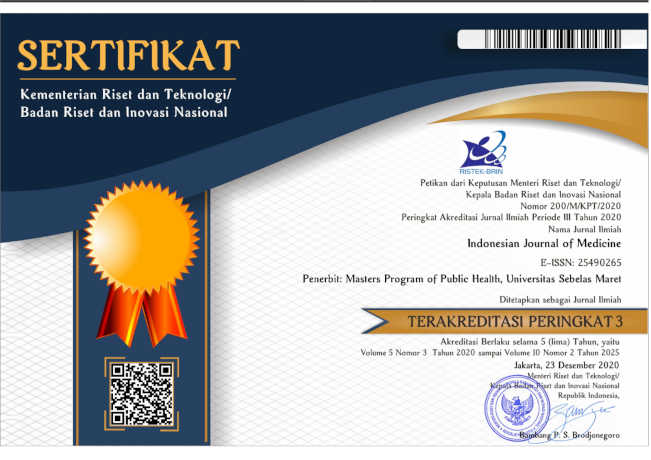Probiotics and Its Effects on the Cognitive Development in Children: A Meta-Analysis
DOI:
https://doi.org/10.26911/theijmed.2022.7.2.551Abstract
Background: Due to its high morbidity and mortality rate, diarrhea is still a major health problem among children, particularly toddlers, in developing countries. One of the causes of diarrhea in children is the side effect of antibiotics or known as antibiotic-associated diarrhea (AAD). Evidences of studies conducted in several countries indicated the high use of antibiotics among children that put the group at a high risk of enduring AAD. Probiotics has shown efficacy in preventing and curing various medical conditions, especially those involving digestive tract in children.
Subject and Method: It was a systematic review and meta- analisis study. Data collection was conducted by obtaining from databases, namely: Google Scholar, PubMed, Scopus and Science Direct. The study was analyzed by using RevMan 5.3 software. Inclusion criteria used were full paper in English with Randomized controlled trial design during the period of 2000-2022. Keywords used were “Probiotic” AND “Antibiotic Associated Antibiotic” AND “Child” AND “Randomized Controlled Trial”.
Results: Meta-analisis was conducted to 9 primary studies from several countries such as Poland, Italy, Korea, Iran, and Australia. Mata-analysis concludes that there were effects of probiotics toward antibiotic-associated diarrhea. Children who were given probiotics had one-third time risk of diarrhea episodes compared to those who were not given probiotics (RR= 0.32; 95% CI= 0.23 to 0.44; p<0.001). Heterogeneity of between-study effect estimates of the meta-analysis data was (I2= 0%; p= 0.096) therefore, calculation of effect estimates was written by using fixed effect approach. Funnel plot did not identify the occurrence of publication bias out of the meta-analysis. Therefore, the funnel plot did not identify the occurrence of publication bias.
Conclusion: Probiotics have effects in reducing antibiotics-associated diarrhea incidences in children.
Keywords: probiotics, diarrhea, antibiotics.
Correspondence:Anggraini Ambarsari. Masters Program in Public Health, Sebelas Maret University. Jalan Ir. Sutami 36A, Surakarta 57126, Jawa Tengah, Indonesia. Email: Aanggraini.ambarsari29@gmail.com. Mobile: 085600184363
Indonesian Journal of Medicine (2022), 07(02): 232-241
https://doi.org/10.26911/theijmed.2022.07.02.11
References
Abbadi NH, Maria CD, Simin NM (2014). Yogurt: role in healthy and active aging. Am. J. clin. Nutr. 99(5): 1263–70. Doi: 10.3945/ajcn.113.073957.
Bin Z, Zheng XY, Hui DZ, Bo C, Rong JL, Vandenplas Y (2015). The efficacy of saccharomyces boulardii cncm i-745 in addition to standard helicobacter pylori eradication treatment in child-ren. Pediatr Gastroenterol Hepatol Nutr. 18(1): 17- 22. Doi: 10.5223/-pghn.2015.18.1.17
Dewi AS, Atifah Y, Farma SA ,Yuniarti E, Fadhilla R (2021). The importance of consuming probiotics for the digestive tract and its relation to the human immune system. SemnasBio, 01(23): 149-156. Doi: 10.24036/prosemnas-bio/vol1/23
Esposito C, Roberti A, Turra F, Cerulo M, Severino G, Settimi A, Escolino M (2018). Frequency of antibiotic associated diarrhea and related complications in pediatric patients who underwent hypospadias repair: a comparative study using probiotics vs placebo. Probiotics Antimicrob. Proteins. 10(07) :323–328. Doi: 10.1007/s1260-2-017-9324-4
Fox MJ, Robertson L, Ball MJ, Eri RD (2015). Can probiotic yogurt prevent diarrhoea in children on antibiotics? A double blind, randomised, placebo controlled study. BMJ Open. 5 (6474):1-6. Doi:10.1136/bmjopen-2014-006474
Georgieva M, Pancheva R, Rashev N, Usheva N, Ivanova L, Koleva K (2015). Use of the probiotic lactobacillus reuteri dsm 17938 in the prevention of antibiotic associated infections in hospitalized bulgarian children: a randomized, controlled trial. IMAB. 21(4): 895-900. Doi: 10.5272/jimab.2015-214.895
Jenie BSL (2018). Pangan probiotics. 1st edn. Bogor: PT Penerbit IPB Press.
Kodadad A, Farahmand F, Mehri N, Maryam S (2013). Probiotics for the treatment of pediatric helicobacter pylori infection: a randomized double blind clinical trial. Iran J Pediatr. 23(1): 79-84.
Kolodziej M, Szajewska H (2019). Lactobacillus reuteri dsm 17938 in the prevention of antibiotic associated diarrhoea in children: a randomized clinical trial. Science Direct., 25 (1) : 699–704. Doi: 10.1016/j.cmi.2018.08.017.
Kotowska MP, Albrecht, Szajewsk HA (20-05). Saccharomyces boulardii in the prevention of antibiotic associated diarrhoea in children: a randomized double blind placebo controlled trial. Aliment. Pharmacol. Ther. 21(01): 583–590.z/10.1111/j.1365-2036.2005.-02356.x.
Murti B (2018). Prinsip dan metode riset epidemiologi. 5th edn. Surakarta: Program Studi Ilmu Kesehatan Masyarakat, Program Pascasarjana, Universitas Sebelas Maret.
Shan L, Hou P, Wang Z, Liu F, Chen N, Shu L, Zhang H, et al. (2013). Prevention and treatment of diarrhoea with sacc-haromyces boulardii in children with acute lower respiratory tract infections. Benef. Microbes. 4(4): 329–34. Doi: 10.3920/BM2013.0008.
Suryawan, ASekartini R (2021). Perkem-bangan otak dan kognitif anak: peran penting sistem imun pada usia dini. Sari Pediatri. 23(4): 279. Doi: 10.14-238-/sp23.4.2021.279-84.
Szymański H, Armańska M, Duplaga KK, Szajewska H (2008). Bifidobacterium longum pl03, lactobacillus rhamnosus kl53a, and lactobacillus plantarum pl02 in the prevention of antibiotic associated diarrhea in children: a randomized controlled pilot trial. Digestion, 01 (78): 13–17. Doi: 10.1159/000-151300.
Olivia F, Hadibroto I, Alam S (2004). Seluk beluk food supplement. PT Gramedia Pustaka Utama.
Zhao Y, Yang Y, Aruna, Xiao J, Song J, Huang T, Li S, et al. (2021). Saccharomyces boulardii combined with quad-ruple therapy for helicobacter pylori eradication decreased the duration and severity of diarrhea: a multi center prospective randomized con-trolled trial. Front.Med. 01 (776955) : 1-8. Doi: 10.3389/fmed.2021.776955











